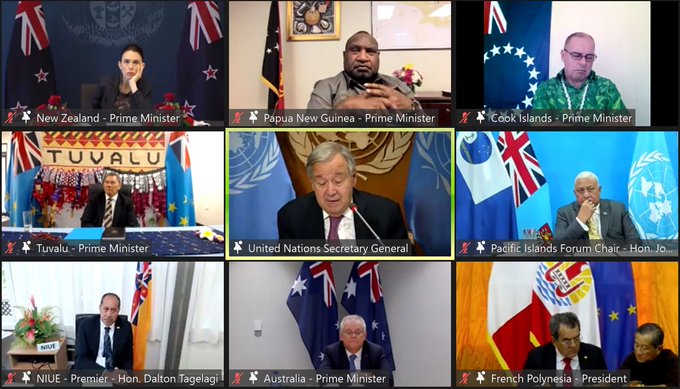Thank you for the opportunity to once again address the Pacific Islands Forum.
Your nations are confronting a dual crisis of climate change and the COVID-19 pandemic.
Both threaten Pacific lives and livelihoods.
If we follow the current path, the consequences of climate disruption for the prosperity, the well-being and the very survival of Pacific communities will be severe.
I witnessed the impacts first-hand during my visit two years ago.
You have been raising the alarm, and your voice must be heard loud and clear in the preparation for the COP26 in Glasgow.
We need more ambition from every country.
More ambition on mitigation.
We need a 45 per cent cut in emissions by 2030 to reach carbon neutrality by mid-century.
Yet Nationally Determined Contributions that currently exist would result in an increase of 16 per cent in emissions by 2030, and that puts us on a catastrophic pathway of 2.7-degrees of global heating.
This must stop. This must be reversed.
We also need more ambition on finance.
Developed countries must live up to the promise of mobilising US$100 billion dollars a year for climate action in developing countries.
Just last week, the OECD reported a gap of at least USD$20 billion.
And – as you know it all too well – we need more ambition on adaptation.
Developing countries received only US$16.8 billion dollars in 2018, compared to adaptation costs of some US$70 billion.
Developed countries and multilateral development banks must urgently increase the share dedicated to adaptation to 50 per cent of climate finance and provide credible support in building resilience to climate impacts.
And we must also further integrate oceans into climate change discussions.
The Ocean absorbs nearly a quarter of annual CO2 emissions, and ocean warming is now being observed 1000 meters deep.
The second United Nations Ocean Conference in 2022 will provide an opportunity for accelerated ocean action for the achievement of Sustainable Development Goal 14. I also welcome the recent launch of the United Nations Decade of Ocean Science for Sustainable Development.
As the COVID-19 pandemic continues to wreak havoc around the world, Small Island Developing States disproportionately bear the brunt of its impacts.
Your tourism industry, supply chains and aviation industries have been dramatically affected.
Your solidarity and regional cooperation complement the massive efforts you are undertaking nationally to address the pandemic.
And despite many challenges, I commend your commitment to ensure vaccination drive as a top priority.
But we need a global vaccination plan. It is essential. I have been asking for it time and time again.
A plan that could be implemented by an emergency Task Force, including the countries that are producing vaccines and the countries that can produce vaccines, the World Health Organisation (WHO), ACT-Accelerator partners, international financial institutions and working with pharmaceutical companies.
A plan that would ensure that vaccines reach seventy percent of the world’s population in the first half of 2022, as the WHO has asked for. It means at least doubling current production and ensuring equitable global distribution
Recovery from the pandemic presents us with a rare opportunity to change course.
As vast sums are mobilised to revitalize economies, we must ensure that those investments reach your countries and place the world on a more sustainable path – with the 2030 Agenda as our roadmap.
Inclusive policies, based on universal human rights, gender equality, health and education remain the best basis for long-term peace, prosperity and well-being.
I applaud the creation of an integrated cooperation framework for the Pacific, well linked to the global and regional review processes.
However, we are not on track.
Recognition of multidimensional vulnerabilities is crucial.
No state should have to choose between rebuilding their economy and servicing their debt.
The Debt Service Suspension Initiative should be extended to vulnerable developing countries and middle-income countries that request it.
And Special Drawing Rights should go to where they are most needed, no matter the income classification before the crisis Today distribution is skewed towards wealthier nations, but money should be distributed according to the needs of nations and people.
I acknowledge the leadership of the Pacific in the development of the Multidimensional Vulnerability Index within the framework of the SAMOA Pathway and the Index is now before the General Assembly.
Finally, we must follow today’s Food Systems Summit with a strong commitment to National Pathways to build further resilience, improve nutrition, tackle non-communicable diseases, and promote sustainable ocean food systems.
I am very grateful for your contributions and commitment to a strong and ambitious United Nations. Our reforms have yielded results, but we will not rest until we have reached our objective of an Organization that effectively implements its mandates and serves those who need us most. That is also the spirit of Our Common Agenda report.
I am pleased that the Multi-Country Office in the North Pacific is becoming operational and wish to thank the Governments of Fiji and Samoa for hosting the other two Multi-Country Offices.
As we confront today’s global crises together, you can count on our solidarity and support. We are on your side, and I thank you.
SOURCE: UN/PACNEWS


















